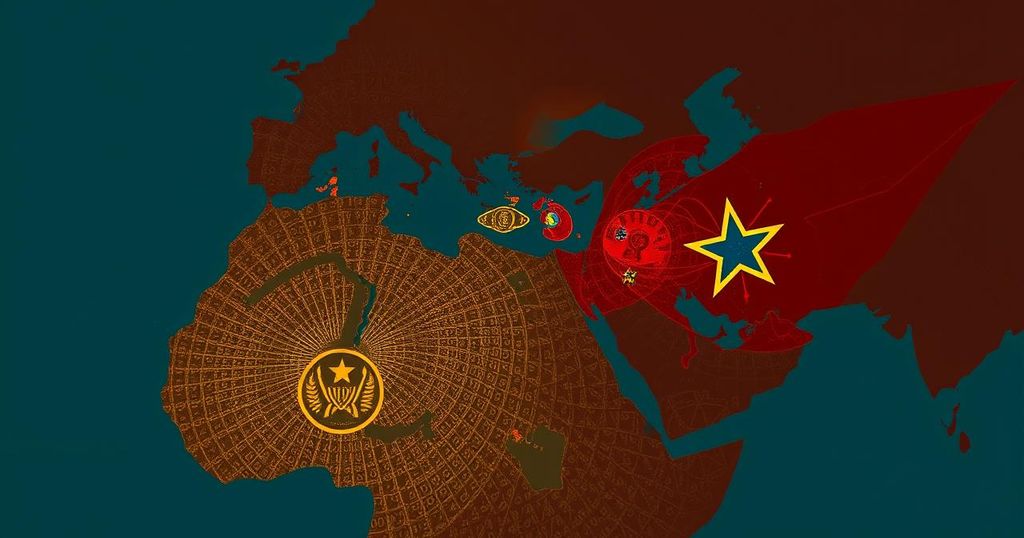Emerging Geopolitical Tensions: The Anti-Ethiopia Alliance in the Horn of Africa
Egypt, Eritrea, and Somalia have recently united to challenge Ethiopia, forming a security partnership aimed at countering perceived threats. This alliance has emerged amidst ongoing disputes over territorial claims and water security, with Egypt increasing its military engagement in Somalia. Concerns are rising over the potential increase in violence and internal strife, particularly with extremist groups seeking to exploit these tensions.
A new geopolitical alliance, composed of Egypt, Eritrea, and Somalia, has emerged to confront Ethiopia, which these nations view as a threat to regional stability. This coalition was formalized during a recent meeting in Asmara, where the leaders of Egypt and Somalia came together with Eritrea’s president to establish a security partnership aimed at strengthening Somali institutions and combatting terrorism. Egypt has previously extended military support to Somalia and has sought to replace Ethiopian peacekeepers operating in the region with its own troops. Ethiopia’s recent lease of a coastal area from Somaliland, viewed by Somalia as its territory, adds to the tension, as does Egypt’s ongoing dispute over Ethiopia’s construction of a major dam on the Nile River, which Cairo argues jeopardizes its water security. Additionally, these countries are engaged in the civil conflict in Sudan, aligning themselves with Sudanese military forces while Ethiopia has partnered with the United Arab Emirates to support rebel factions. This newly formed alliance comes in the context of Egypt’s ambitions in the Horn of Africa, which are intensified by its historical rivalry with Ethiopia. Critics of Somalia’s government argue that the alignment with Egypt could lead to increased internal conflicts and boost militant groups like al-Shabab, which could exploit the situation to further their agenda against the Somali central government. The specter of renewed violence in the region looms ominously as the strategic maneuvering of Egypt and Eritrea may provoke Ethiopia into conflict. This alliance raises concerns about the stability of Somalia—which has already struggled with internal divisions and violence—and indicates a potential escalation in regional tensions. Observers warn that, given the leadership styles of the involved parties, this situation could evolve into a broader conflict. Abiy Ahmed’s dual approach of seeking peace while engaging in military posturing may further exacerbate the situation, fueling fears of a regional crisis that could destabilize one of the world’s most volatile areas.
The Horn of Africa has long been characterized by complex geopolitical dynamics, with Ethiopia, Egypt, and Sudan often at the center of disputes over resources, territorial integrity, and political influence. Ethiopia’s construction of the Grand Ethiopian Renaissance Dam has led to significant tensions with Egypt over water security, while Eritrea’s historical conflicts with Ethiopia compound regional animosities. This context is essential to understanding the motivations behind the newly formed coalition among Egypt, Eritrea, and Somalia. As they align their interests against Ethiopia, the implications for regional security and stability are significant, particularly in light of Somalia’s fragile governance structure and enduring threats from extremist groups.
The formation of an anti-Ethiopia alliance among Egypt, Eritrea, and Somalia represents a critical juncture in the geopolitics of the Horn of Africa. It underscores the fragility of regional stability, particularly as these nations grapple with internal and external threats. The decisions made by these leaders will not only impact their countries but may also lead to heightened tensions that could spiral into broader conflict, affecting millions across the region. As each member of the alliance seeks to assert its interests, the advocacy for peace and reconciliation must remain a central concern for international observers. The strategic alliances being forged in this volatile area call for attention to avert a potential new conflict that could have devastating consequences for the local populations and broader regional dynamics.
Original Source: foreignpolicy.com




Post Comment